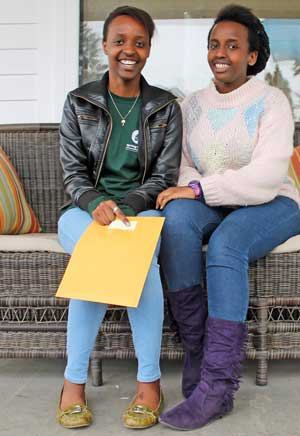Born into a rapidly developing country, only a few years after genocide raged within its borders, Rwandan students Zula Mucyo and Michaella Ibambasi of Spring Street International School share a deep connection with the place they call home.
“I feel like I’m a citizen of Rwanda and there’s a responsibility I have toward my country,” Michaella said. “If every young adult that studied abroad stayed here or in other countries, we wouldn’t do well.”
Neither of the girls have been back home to Rwanda since they began their studies in Friday Harbor, and while their traditions and families are greatly missed, they’re grateful for the opportunity to attend school in the United States.
Zula is the first Rwandan student to be enrolled at Spring Street and is about to graduate after a year and a half. Michaella arrived in September 2014 and will soon finish her junior year. Both girls are on full scholarships to Spring Street and were students at the Gashora Girls Academy, Spring Street’s partner Rwandan school.
The Rwandan academy is an upper-secondary boarding school founded by the Seattle-based Rwanda Girls Initiative. The school has the capacity for only 270 students, who are admitted largely based on the scores of the Rwandan schooling system’s national exam.
Friday Harbor native Jennie McCulloch, who teaches at Gashora in Rwanda, said the girls who attend the academy are essentially the smartest in the country, which is clearly evident after talking to Zula and Michaella.
At the tender ages of 17 and 18, these foreign-exchange students are fluent and articulate in multiple languages, more mature than the average high schooler and acutely aware of the social revolution going on back home.
“Rwanda is really rising up from its ashes,” Zula said, “to have a united society where everyone participates.”
In traditional Rwandan culture, girls are expected to dress, sit, and address people a certain way. They’re expected to be more elegant and less bold, Michaella said.
“But new Rwanda is more western and those norms are on their way out,” she said.
Still, it wasn’t exactly easy for the girls’ parents to send their young daughters off to a foreign country, especially because it won’t be until after graduation that they are reunited.
Despite this, Zula’s parents pushed her to accept a scholarship at Spring Street. While Michaella’s parents were apprehensive for her to be on her own, they soon learned to trust her.
Since arriving in Friday Harbor the girls have had an array of first-time experiences, like flying on an airplane, learning to swim and riding a bicycle. In her spare time Zula takes hip-hop dances classes and acts in the school play. Michaella is taking a ballet class and recently joined the San Juan Singers.
They are well adapted to life in Friday Harbor, but certain Rwandan traditions that were once a constant now seem like a distant memory, like the native “Amaraba” dance.
In Rwandan culture the cow is sacred. The dance imitates the gentleness in which the animals walks and the boldness of its horns. Michaella would like the opportunity to teach people here the dance she loves so much.
Coming to school in Friday Harbor is worth more than just cultural exchange and first time experiences. The opportunity to study at Spring Street is a stepping stone toward Michaella and Zula’s future.
“I was never hoping for my parents to pay for me to go to college here, or even in Rwanda, where some schools are very expensive,” Michaella said.
Michaella may still be an entire year away from college but it’s certainly what she’s working toward. Zula was recently offered a full scholarship to attend Quest University in British Columbia.
Even with this exciting news on the frontier, home is not far from her thoughts.
“The whole point of this is to study in developed countries and bring that knowledge back to Rwanda,” she said.



